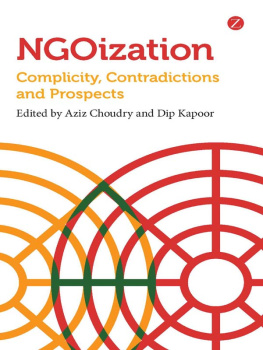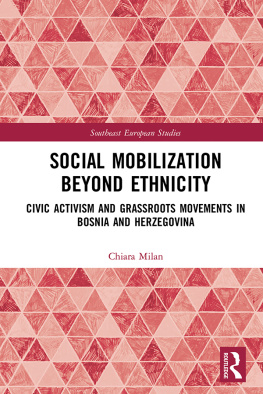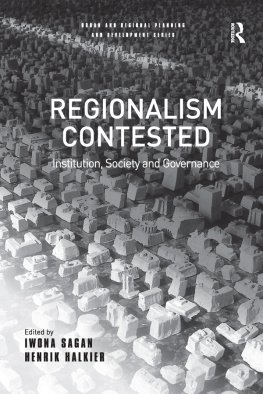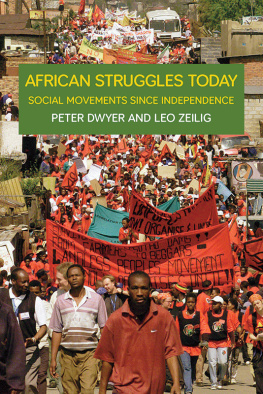
About the Editors
Aziz Choudry is assistant professor in the Department of Integrated Studies in Education at McGill University, Canada. He is co-author of Fight Back: Workplace Justice for Immigrants (Fernwood, 2009), and co-editor of Learning from the Ground Up: Global Perspectives on Social Movements and Knowledge Production (Palgrave Macmillan, 2010) and Organize! Building from the Local for Global Justice (PM Press/Between the Lines, 2012). With over 25 years of experience as a social, environmental and political activist, educator and researcher, he currently sits on the boards of the Immigrant Workers Centre, Montreal and the Global Justice Ecology Project. He is also a co-initiator and part of the editorial team of www.bilaterals.org, a website supporting resistance against bilateral free trade and investment agreements.
Dip Kapoor is professor of international education in the Department of Educational Policy Studies at the University of Alberta, Canada. He is Research Associate and Founding Member of the Centre for Research and Development Solidarity (CRDS), an Adivasi (original dweller)-Dalit rural peoples organization in Orissa, India. His relationship with the Adivasi-Dalit Ekta Abhijan (ADEA) land and forest movement in Orissa goes back to the early 1990s. Recent co-edited collections include: Education, PAR, and Social Change; Education, Decolonization and Development; Indigenous Knowledge and Learning in Asia/Pacific and Africa; Learning from the Ground Up: GlobalPerspectives on Social Movements and Knowledge Production and Globalization, Culture and Education in South Asia: Critical Excursions.
NGOization
Complicity, Contradictions and Prospects
Edited by Aziz Choudry and Dip Kapoor

Zed Books
London & New York
NGOization: Complicity, Contradictions and Prospects was first published in 2013 by Zed Books Ltd, 7 Cynthia Street, London N1 9JF, UK and Room 400, 175 Fifth Avenue, New York, NY 10010, USA
This ebook edition was first published in 2013
www.zedbooks.co.uk
Editorial Copyright Aziz Choudry and Dip Kapoor 2013
Copyright in this collection Zed Books 2013
The right of Aziz Choudry and Dip Kapoor to be identified as the editors of this work have been asserted by them in accordance with the Copyright, Designs and Patents Act, 1988
Typeset in Plantin by Palimpsest Book Production Ltd, Falkirk, Stirlingshire
Index: Rohan Bolton
Cover design: www.reactor15.com
All rights reserved. No part of this publication may be reproduced, stored in a retrieval system or transmitted in any form or by any means, electronic, mechanical, photocopying or otherwise, without the prior permission of Zed Books Ltd.
A catalogue record for this book is available from the British Library
Library of Congress Cataloging in Publication Data available
ISBN 978 1 78032 260 5
Acknowledgments
The impetus for this collection emerges from our own involvement with social movements and non-governmental organizations (NGOs), conversations, dilemmas and questions shared with colleagues, friends and comrades, including each other. While the concerns and tensions which propel this book are not new, we hope that, collectively, we bring some new perspectives to help think through the complexities of social, political and ecological action in ways that are relevant to present and future movements of resistance, as well as to critical scholars, students, NGO practitioners and a wider public.
First, we extend our heartfelt gratitude to all of the contributors to this book for their insights and willingness to see this project through to its completion. Many thanks to Sangeeta Kamat for her preface.
Secondly, our thanks go to Tamsine ORiordan, our editor at Zed Books, Ken Barlow and Kika Sroka-Miller for their commitment to this book. We are grateful to our editorial assistant, Rima Athar, for her excellent work in copy-editing and formatting the manuscript. We also thank the team at Palimpsest Book Production for their professionalism in the final layout stages.
Aziz is deeply indebted to the many activists, organizers, colleagues and friends with whom he has worked, and the hours and days of discussions on the role of NGOs and the impacts of NGOization on social movements for many years. In particular, he is grateful for the unfailing support and comradeship of Radha DSouza, Leigh Cookson, Sunera Thobani, Chris Rahim, David Bleakney, Devlin Kuyek, Rene Vellv, Eric Shragge, David Austin, Steve Jordan and Wali Haider.
Preface
Sangeeta Kamat
The future of neoliberalism is uncertain today, and with it the institutional form of the NGO (non-governmental organization) that has existed as a compulsory feature of neoliberalization for the past four decades. To say neoliberalism is dominant but dead (), or what the authors in this volume reference as the professionalization of dissent.
As this collection of research on NGOs and NGOization in diverse contexts illustrates, neoliberal policies and NGOs appear to be ubiquitous. The chapters in this collection represent the spread of NGOs in places as diverse as South Africa, Kyrgyzstan, India, Canada, Serbia and the Philippines, among equally diverse communities including Indigenous Peoples, fishing communities, feminists, farmers and the urban poor. What is common among these research sites, each possessing remarkably different histories that have been richly delineated, is that NGOs are the favored institutional form through which every social problem is to be addressed, be it domestic violence, ecological devastation, food security or the aftermath of war. The present volume is a collection of case studies about NGOization that are exceptional for their thick descriptions of the contestations within NGOs and the solidary between NGOs and peoples movements and issues that show up in unlikely places in unexpected moments. While the case studies unequivocally establish that NGOization stalls and obstructs processes of authentic democratization, the studies also caution us against easy equivalences between NGOs and NGOization.
As one reads across these varied contexts, the books project of interrogating the precise character of NGOization in specific places of appreciating the differences in political trajectories and social relations that embed and define the limits of NGOization in each context, and the struggles and contestations made palpable by the authors analytic oeuvre appears in sharp relief to the generalities about NGOs as handmaidens of imperialism or bearers of cosmopolitan democracy. The importance of this project, which seeks to produce a politics of militant particularisms () and mobilize resources for creative engagement rather than cynicism and despair, is not to be underestimated.
A radical transformative politics requires that militant particularisms that is, particular struggles in particular places are properly brought together to advance the general interest (of NGOization or towards building alliances with social movement organizations and peoples struggles.
Geopolitics as an important factor in NGOization is most evident in the post-socialist countries (Kyrgyzstan and Serbia in this case), where the rush to showcase the success of capitalist democracy by western powers and national elites leads to a veritable explosion of NGOs that struggle to become adept with the requirements of international aid agencies and are unable to respond to the true suffering of the people in whose name they serve. In these, as in other case studies (notably Orissa, Tamil Nadu, Serbia and the Indigenous Peoples movements in North America), the political convictions of the activists and the histories and memories of organizing they share, each probably co-constitutive of the other, lead them to resist processes of NGOization and in some instances to reject NGOs as a politically viable organizational form.
Next page
















